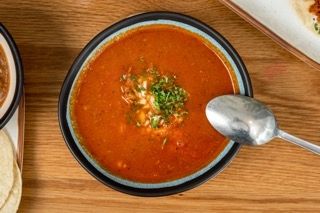Treat yourself to churros that are warm and irresistible
Wiki Article
Is Mexican Food Healthy And Balanced? Unpacking the Nutritional Conveniences of Traditional Components
The concern of whether Mexican food is healthy invites an expedition of its typical active ingredients. Beans and corn act as foundational staples, abundant in protein and fiber. Avocados offer advantageous fats, while various natural herbs and spices include flavor and health and wellness advantages - mexican food. With each other, these elements develop a tapestry of nourishment. The healthiness of Mexican cuisine usually depends on prep work techniques and part dimensions. What duty do these variables play in identifying its overall dietary worth?The Power of Beans: Protein and Fiber-Rich Staples
Although commonly overlooked, beans act as a keystone of Mexican food, offering a wealth of nutritional advantages. Rich in healthy protein, they are a superb plant-based choice for those seeking to meet their nutritional healthy protein needs. This high healthy protein web content sustains muscle mass repair service and growth, making beans indispensable for both meat-eaters and vegetarians alike. Furthermore, beans are a phenomenal resource of dietary fiber, which aids in food digestion and promotes a feeling of fullness, possibly assisting with weight administration.The selection of beans made use of in Mexican meals, such as black beans, pinto beans, and kidney beans, adds to a varied flavor account and can enhance dishes nutritionally. Beans are low in fat and include crucial vitamins and minerals, consisting of magnesium, folate, and iron. Together, these attributes make beans a crucial active ingredient, providing both nutrients and food in traditional Mexican price.

Corn: a Versatile Grain With Nutritional Advantages
Corn attracts attention as a versatile grain essential to Mexican food, commemorated not only for its culinary applications however likewise for its outstanding dietary account. As a primary ingredient in meals like tortillas, tamales, and pozole, corn gives essential nutrients that contribute to a balanced diet plan. Rich in carbs, it functions as a considerable energy source, while likewise being low in fat, making it a beneficial choice for different nutritional requirements.Corn is a good source of dietary fiber, which aids in food digestion and advertises satiation. It consists of substantial quantities of vitamins such as B-complex vitamins, which are essential for basal metabolism. The visibility of anti-oxidants, specifically carotenoids, adds to total wellness by lowering oxidative anxiety. Furthermore, corn is gluten-free, satisfying those with gluten level of sensitivities. On the whole, the dietary benefits of corn underscore its relevance in typical Mexican food and its function in a healthy diet regimen.
Avocados: Healthy Fats and Nutrients in Every Bite
Avocados play a substantial function in Mexican cuisine, complementing dishes with their luscious structure and rich taste. Past their cooking appeal, avocados are celebrated for their impressive dietary profile. They are an abundant source of healthy and balanced monounsaturated fats, which can help reduced poor cholesterol degrees and support heart health. In addition, avocados are packed with essential nutrients, consisting of potassium, vitamin E, and B vitamins, adding to overall health.The high fiber content in avocados help digestion and advertises satiety, making them a beneficial enhancement to any type of dish. Their distinct nutrient make-up can likewise sustain skin health and supply anti-inflammatory benefits. Incorporating avocados right into conventional Mexican recipes or enjoying them as a standalone treat can enhance both taste and nutrition, demonstrating why they are a cherished staple in Mexican cuisine. Overall, avocados use a scrumptious method to appreciate healthy fats and vital nutrients in every bite.
Seasonings and Natural Herbs: Flavorful Health Boosters
While enjoying the rich tastes of Mexican food, one can not forget the crucial function that spices and herbs play in enhancing both preference and wellness. Components such as cilantro, oregano, and chili peppers not just add to the vivid taste account but also supply considerable health and wellness benefits. Cilantro is recognized for its detoxing buildings, helping to eliminate hefty metals from the body, while oregano is packed with anti-oxidants and possesses anti-inflammatory effects.Chili peppers, a staple in several Mexican meals, include capsaicin, which has been linked to boosted metabolic process and pain alleviation. Furthermore, spices like cumin and coriander assistance food digestion and may assist in blood glucose regulation. Incorporating these savory health and wellness boosters into dishes not only enhances the cooking experience but additionally promotes overall wellness, making Mexican cuisine not simply delicious, yet also nutritionally useful.
Standard Cooking Approaches: Enhancing Nutrition and Taste
Traditional food preparation methods in Mexican food play a necessary function in boosting both nutrition and taste, as they frequently focus on time-honored techniques and fresh ingredients. Strategies such as nixtamalization, where corn is saturated and cooked in an alkaline remedy, not only enhance the nutrient account of tortillas but likewise improve their digestibility - freshly made guacamole. Furthermore, making use of slow cooking techniques, like cooking or braising, allows flavors to blend wonderfully while keeping the honesty of the active ingredients
Regularly Asked Inquiries
Are Mexican Food Portions Usually Larger Than Various Other Cuisines?
Mexican food parts are often larger than those of several other cuisines. This characteristic shows conventional eating practices, emphasizing common sharing and hearty meals, which can cause a more tacos considerable offering size generally.
How Does the Preparation Approach Affect Healthiness of Mexican Food?
Preparation techniques substantially influence the healthfulness of Mexican food. Techniques such as grilling or steaming protect nutrients, while frying can boost harmful fat web content. Choices of ingredients and cooking styles eventually establish overall nutritional value.Can Mexican Food Be Tailored for Specific Dietary Limitations?
Mexican food can undoubtedly be customized for details nutritional constraints. Substitutions, such as using corn tortillas for gluten-free diets or incorporating even more veggies, make it possible for people to appreciate traditional flavors while suiting numerous dietary demands.What Are Common Mistaken Beliefs Regarding Mexican Food and Health And Wellness?
Typical mistaken beliefs concerning Mexican food consist of the idea that it is naturally harmful, extremely zesty, and solely concentrated on fats. In fact, standard meals often include nourishing active ingredients and can be tailored to numerous dietary demands.Exist Healthier Options at Mexican Dining Establishments?
Much healthier choices at Mexican restaurants often consist of barbequed meats, beans, and fresh vegetables. Choosing dishes that stress entire components and avoiding hefty sauces can cause a much more nutritious eating experience, advertising general well-being.The selection of beans made use of in Mexican meals, such as black beans, pinto beans, and kidney beans, contributes to a varied flavor account and can improve meals nutritionally. Avocados play a substantial function in Mexican cuisine, complementing recipes with their velvety texture and abundant flavor. Including avocados into typical Mexican dishes or enjoying them as a standalone treat can improve both taste and nourishment, showing why they are a beloved staple in Mexican food. While delighting in the abundant tastes of Mexican cuisine, one can not ignore the important role that spices and herbs play in improving both taste and health. Typical cooking techniques in Mexican food play a necessary role in enhancing both nutrition and flavor, as they commonly prioritize fresh ingredients and classic methods.
Report this wiki page